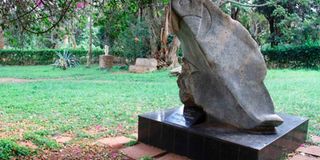Reflections at Murumbi graves

Elkana Ongesa’s Bird of Peace watches over the Murumbi graves.
The graves have been raided; land grabbers have encroached; and sculptures have been vandalised
Alan Donovan opened his lovingly illustrated memoir, ‘My Journey Through Africa’ with a quotation from the film version of ‘Out of Africa’. It has Denys Finch Hatton saying to Karen Blixen, ‘We are not owners here, Karen, we’re just passing through.’
Sadly, Alan Donovan, after living in Africa for five decades, has himself passed through. At the age of 81, after doing more than perhaps anyone to raise our awareness of the richness of African art, Alan died early last month.
From his native America – born on a farm in Colorado – he first came to Africa in 1967, the same year I did. He came as a food relief officer in Biafra, the attempted breakaway region in the east of Nigeria. There, he witnessed the bitterness and cruelty of war. After two years he resigned his post, bought a Volkswagen mini-bus in Paris, and travelled through the Sahara Desert to Nigeria, and then across to the Congo and, finally, to Kenya – arriving in Nairobi in March 1970. As he says in his book, since then he ‘served as a conduit and catalyst to reveal the awesome beauty of Africa’.
He founded African Heritage in Nairobi – the continent’s first pan-African Gallery. His co-founder was Joseph Murumbi, Kenya’s second Vice-President and collector of African art. I had the privilege to interview Murumbi not long before he died. In his wheelchair, he showed me the magnificent collection of art works he had in his house. I asked him why he had resigned as Vice President in 1966 after only 10 months in office. His words said much more than their literal meaning: ‘Everything you have seen in this house I have bought with money I have earned.’
I have been fortunate, also, to talk many times with Alan Donovan. Once, we were sitting in the garden of his amazing African Heritage House, with a design inspired by the mud architectures Alan had seen in his travels across Africa. Overlooking the Nairobi National Park, it became, as he said, ‘the most photographed house in Africa.’
I met him at the Kampala Serena, when he was working on replicas of ancient terracotta sculptures that were to be displayed in the hotel’s public rooms. There was the time when he was setting up an exhibition of Murumbi’s vast stamp collection in the National Archives in Moi Avenue.
A few times we have talked at the Nairobi Gallery at the corner of Kenyatta Avenue and Uhuru Highway. It is there that Alan Donovan made sure there would be a fitting home for the Murumbi African Heritage Collections.
For Alan, Murumbi was a close friend as well as a business partner. Since Murumbi’s death in 1990, Alan devoted much of his time to ensuring that his friend would be honoured for what he did as a patriot, a pan-Africanist and a collector of African art. And he wanted to, if not erase, but at least soften the memory that Murumbi had been betrayed by the government that had promised to support the creation of a Pan-African Studies Centre at his house in Muthaiga that he had sold to them.
It was not an easy task. Alan endured many bureaucratic delays and rebuffs. Even securing a resting place for Joseph and Sheila Murumbi in the City Park has had some grim challenges. The graves have been raided; land grabbers have encroached; sculptures have been vandalised.
Last Sunday, I went to see how the Murumbi Peace Memorial Garden is now. I was disappointed. Weeds are growing around the paving stones; the information boards are faded and peeling. The place is not well tended. The whole City Park is in a scruffy state.
It is good that the African Heritage House has been made a National Monument. But it now needs a guardian who will carry on Alan Donovan’s work, so that the place will continue to live up to its name.
John Fox is Chairman of iDC Email: [email protected]





